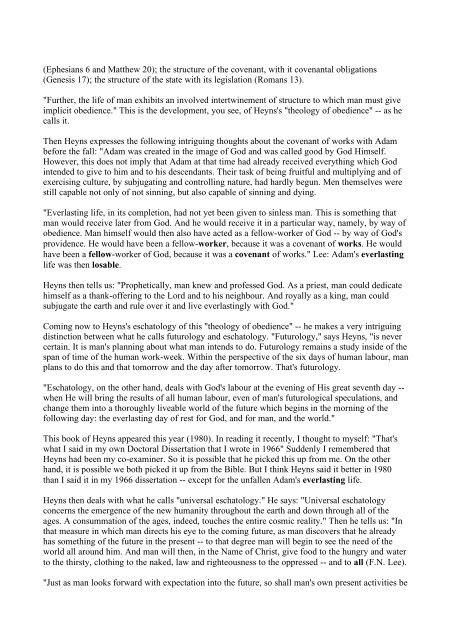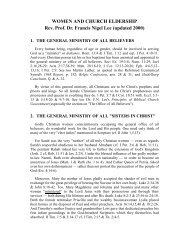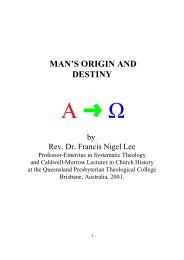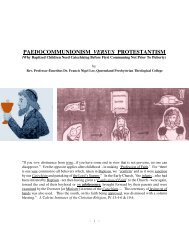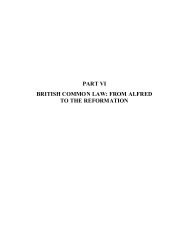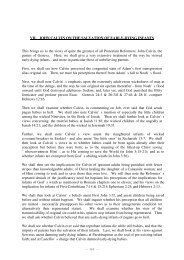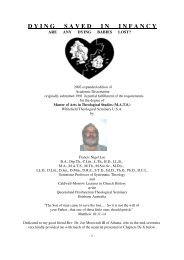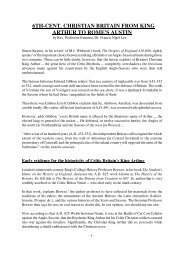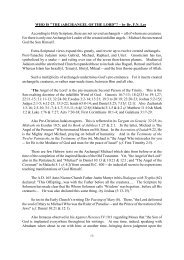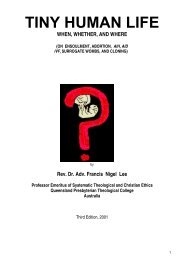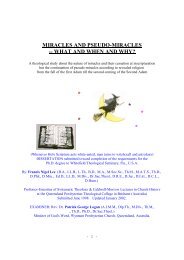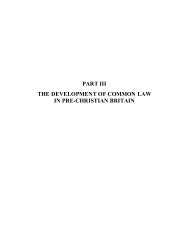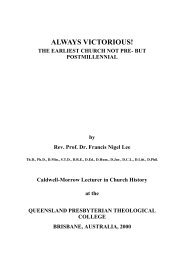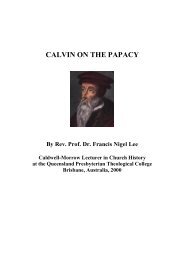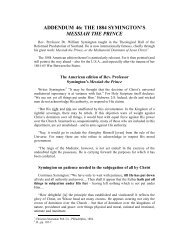THE CHRISTIAN AFRIKANERS - The Works of F. N. Lee
THE CHRISTIAN AFRIKANERS - The Works of F. N. Lee
THE CHRISTIAN AFRIKANERS - The Works of F. N. Lee
You also want an ePaper? Increase the reach of your titles
YUMPU automatically turns print PDFs into web optimized ePapers that Google loves.
(Ephesians 6 and Matthew 20); the structure <strong>of</strong> the covenant, with it covenantal obligations(Genesis 17); the structure <strong>of</strong> the state with its legislation (Romans 13)."Further, the life <strong>of</strong> man exhibits an involved intertwinement <strong>of</strong> structure to which man must giveimplicit obedience." This is the development, you see, <strong>of</strong> Heyns's "theology <strong>of</strong> obedience" -- as hecalls it.<strong>The</strong>n Heyns expresses the following intriguing thoughts about the covenant <strong>of</strong> works with Adambefore the fall: "Adam was created in the image <strong>of</strong> God and was called good by God Himself.However, this does not imply that Adam at that time had already received everything which Godintended to give to him and to his descendants. <strong>The</strong>ir task <strong>of</strong> being fruitful and multiplying and <strong>of</strong>exercising culture, by subjugating and controlling nature, had hardly begun. Men themselves werestill capable not only <strong>of</strong> not sinning, but also capable <strong>of</strong> sinning and dying."Everlasting life, in its completion, had not yet been given to sinless man. This is something thatman would receive later from God. And he would receive it in a particular way, namely, by way <strong>of</strong>obedience. Man himself would then also have acted as a fellow-worker <strong>of</strong> God -- by way <strong>of</strong> God'sprovidence. He would have been a fellow-worker, because it was a covenant <strong>of</strong> works. He wouldhave been a fellow-worker <strong>of</strong> God, because it was a covenant <strong>of</strong> works." <strong>Lee</strong>: Adam's everlastinglife was then losable.Heyns then tells us: "Prophetically, man knew and pr<strong>of</strong>essed God. As a priest, man could dedicatehimself as a thank-<strong>of</strong>fering to the Lord and to his neighbour. And royally as a king, man couldsubjugate the earth and rule over it and live everlastingly with God."Coming now to Heyns's eschatology <strong>of</strong> this "theology <strong>of</strong> obedience" -- he makes a very intriguingdistinction between what he calls futurology and eschatology. "Futurology," says Heyns, "is nevercertain. It is man's planning about what man intends to do. Futurology remains a study inside <strong>of</strong> thespan <strong>of</strong> time <strong>of</strong> the human work-week. Within the perspective <strong>of</strong> the six days <strong>of</strong> human labour, manplans to do this and that tomorrow and the day after tomorrow. That's futurology."Eschatology, on the other hand, deals with God's labour at the evening <strong>of</strong> His great seventh day --when He will bring the results <strong>of</strong> all human labour, even <strong>of</strong> man's futurological speculations, andchange them into a thoroughly liveable world <strong>of</strong> the future which begins in the morning <strong>of</strong> thefollowing day: the everlasting day <strong>of</strong> rest for God, and for man, and the world."This book <strong>of</strong> Heyns appeared this year (1980). In reading it recently, I thought to myself: "That'swhat I said in my own Doctoral Dissertation that I wrote in 1966" Suddenly I remembered thatHeyns had been my co-examiner. So it is possible that he picked this up from me. On the otherhand, it is possible we both picked it up from the Bible. But I think Heyns said it better in 1980than I said it in my 1966 dissertation -- except for the unfallen Adam's everlasting life.Heyns then deals with what he calls "universal eschatology." He says: "Universal eschatologyconcerns the emergence <strong>of</strong> the new humanity throughout the earth and down through all <strong>of</strong> theages. A consummation <strong>of</strong> the ages, indeed, touches the entire cosmic reality." <strong>The</strong>n he tells us: "Inthat measure in which man directs his eye to the coming future, as man discovers that he alreadyhas something <strong>of</strong> the future in the present -- to that degree man will begin to see the need <strong>of</strong> theworld all around him. And man will then, in the Name <strong>of</strong> Christ, give food to the hungry and waterto the thirsty, clothing to the naked, law and righteousness to the oppressed -- and to all (F.N. <strong>Lee</strong>)."Just as man looks forward with expectation into the future, so shall man's own present activities be


